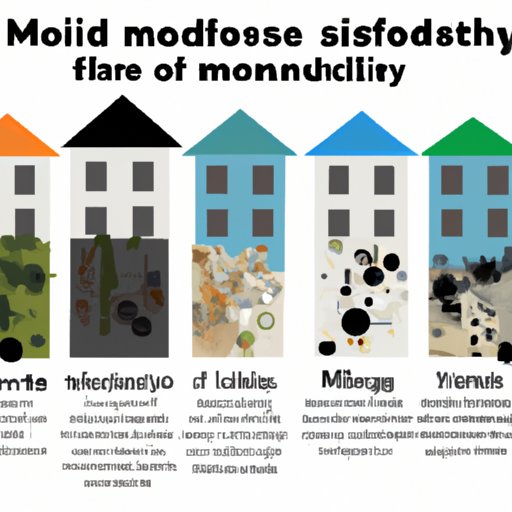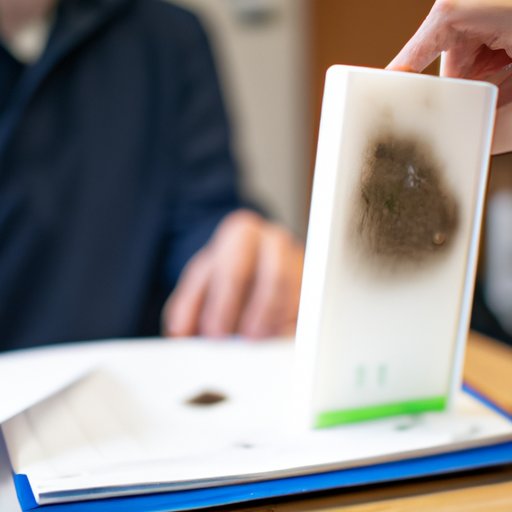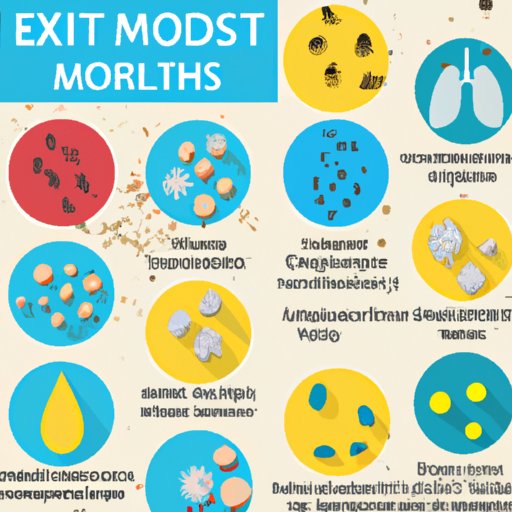Introduction
Mold is a type of fungus that can grow almost anywhere, indoors or outdoors. It is found in damp environments and feeds on organic matter like wood, paper, fabrics, and insulation. Exposure to mold can cause a wide range of health problems, from mild allergic reactions to more severe respiratory issues.

Types of Mold and Their Effects on Human Health
There are many different types of mold, including Aspergillus, Stachybotrys chartarum (also known as black mold), Cladosporium, Penicillium, Alternaria, and Fusarium. These molds can be found in both indoor and outdoor environments, but are most likely to grow in areas with high humidity and moisture levels.
Different types of mold can have different effects on human health. Some types of mold may only cause minor allergic reactions, while others can cause more severe respiratory problems. For example, exposure to black mold has been linked to neurological and immunological problems, as well as chronic coughing and wheezing. A study published by the Centers for Disease Control and Prevention (CDC) found that people who lived in buildings with higher concentrations of airborne mold spores were more likely to suffer from upper respiratory symptoms than those living in buildings with low levels of mold spores.
Symptoms of Mold-Related Illness
Exposure to mold can cause a variety of symptoms, including sneezing, coughing, headaches, and watery eyes. In some cases, it can also lead to more serious respiratory issues like asthma or bronchitis. If you are experiencing any of these symptoms, it is important to determine if they are caused by mold exposure. The best way to do this is to consult a doctor who can evaluate your symptoms and provide an accurate diagnosis.

Investigating How Mold Grows and Spreads in Indoor Environments
Mold grows and spreads quickly in damp, humid environments. Common sources of moisture in the home include flooding, plumbing leaks, and condensation. Other factors that contribute to mold growth include poor ventilation, inadequate cleaning, and lack of maintenance. To prevent mold growth in the home, it is important to keep areas dry and well ventilated, clean regularly, and fix any plumbing or water damage as soon as possible.
Analyzing the Impact of Long-Term Mold Exposure on Health
Long-term exposure to mold can have serious health consequences. Studies have shown that people who live in homes with high levels of mold spores are at increased risk for developing chronic respiratory illnesses such as asthma and COPD. They are also more likely to experience fatigue, memory loss, and other neurological symptoms. To reduce the risk of long-term health problems from mold, it is important to identify and eliminate potential sources of mold in the home.

Evaluating the Role of Mold in Allergic Reactions and Asthma
In addition to causing respiratory illness, mold can also trigger allergic reactions and asthma attacks. According to a study published in the European Respiratory Journal, exposure to mold can increase the risk of developing asthma in children and adults. Treatments for allergies and asthma related to mold exposure include medications, avoidance of moldy environments, and allergen immunotherapy.
Assessing the Potential Dangers of DIY Mold Removal
DIY mold removal can be dangerous if not done properly. Without the proper safety equipment, you could be exposing yourself to harmful mold spores. If mold is present in your home, it is best to seek professional help for mold removal. Professional mold remediators are trained to safely remove mold and prevent its spread throughout the home.
Conclusion
Mold is a common problem that can have serious negative impacts on your health. Different types of mold can cause different health effects, ranging from mild allergic reactions to more severe respiratory issues. To protect yourself from the dangers of mold, it is important to be aware of the signs of mold exposure, take steps to prevent mold growth in the home, and seek professional help for mold removal if necessary. By educating yourself about mold and its effects on health, you can reduce your risk of developing mold-related illnesses.
(Note: Is this article not meeting your expectations? Do you have knowledge or insights to share? Unlock new opportunities and expand your reach by joining our authors team. Click Registration to join us and share your expertise with our readers.)
